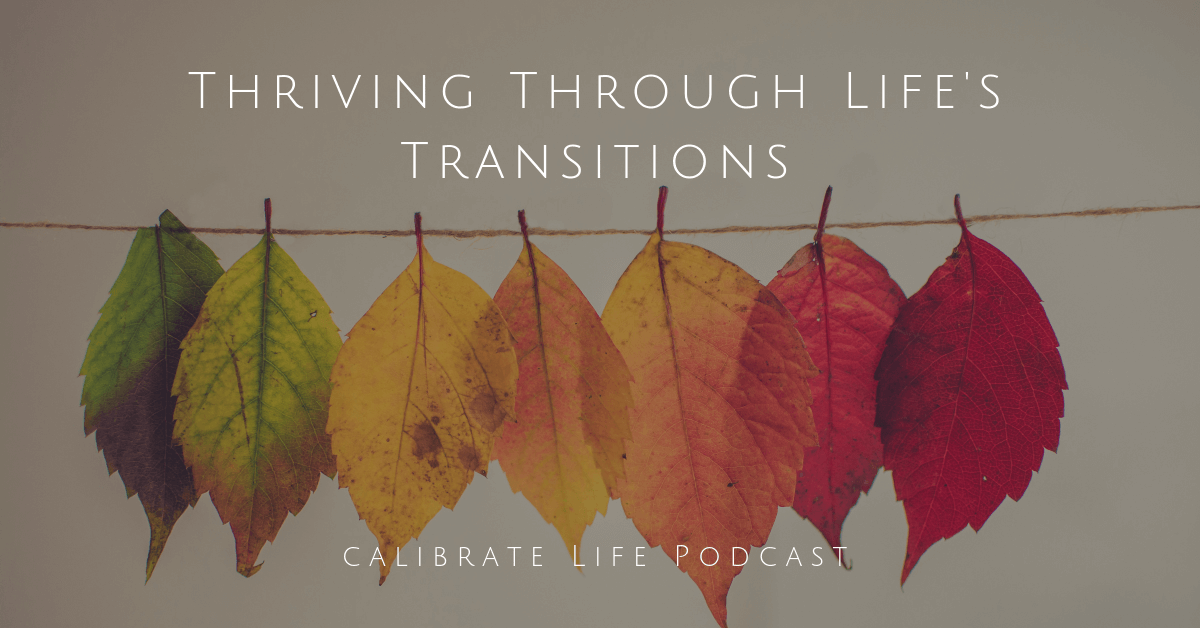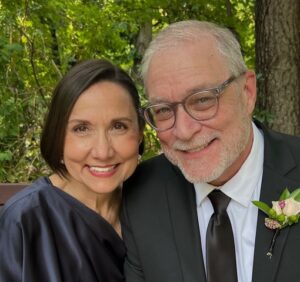Podcast: Play in new window | Download

Change and resulting life transitions are a big part of our lives, everything is constantly changing. We are either living or dying, but never really static. Transitions are the life zones between where we were and where we are going. In this episode of the Calibrate Life Podcast, David and Donna discuss thriving through life’s transitions.
Listen to the Podcast…

Continue Reading for Our Episode Notes…
Thriving Through Life’s Transitions
Change is a big part of our lives, everything is constantly changing. We are either living or dying, but never really static. Transition is the life zone between where we were and where we are going.
The grief process was a transition. Change came to our lives, and the transition from our known lives and who we were to where we were going and who we were going to be was the biggest transition either of us had ever faced.
Change is either painful or wonderful, but it is always constant.
Transition is that place between two places in life, where we are still connected to the former and trying to connect to the latter. We transition from one place to another, from one house to another, from one situation of employment to another situation. From one season of life to another. Always, we gradually morph from one reality to the next.
We’ve been through many transitions in our lives, and we are in the middle of the second greatest transition we’ve yet navigated, with more to come.
During my prayer and writing time a few weeks ago while in the World Missions interview process, I sat in a slightly dingy hotel room and reflected a bit upon the challenges and reality of life transition. This present transition is not a quick transition from one place of employment to another, but it is a long transition.
What does transition look like? For us…
- We are once again changing our way of life, while some things remain.
- We are establishing new friendships and relationships, while many remain constant.
- We are setting up and learning a lot of new systems and a new vocabulary.
- We are learning multiple new cultures.
- We are embracing a new identity.
- We are trying to fit in, not look stupid, admit what we don’t know.
- We are continuing our life journey, but we are also starting over.
- We will be spending the next few years in transition. We will spend the next 9 to 12 months resourcing the mission, we will then acclimate to a new culture, and a new team environment.
The cycles of transition.
Transitions are completed in a non-linear cycle. The scope and scale of the transition determines how radical each phase of the cycle.
- We begin in a settled, engaged, and familiar state.
- We disengage (at least to some degree) the familiar, we “unsettle” ourselves, and we move into the unfamiliar.
- We experience the chaos of the transition.
- We start finding our place and resettling.
- We engage the new place.
- We come to a place of engagement, things become familiar, and we feel settled.
Again, these phases are non-linear meaning they can occur and reoccur out of sequence.
Looking at our current transition, our second largest life transition, I recognize the path because it is not unlike our biggest life transition. The process of grieving a spouse is a major life transition. Our world radically changes instantly. Some things are the same, but everything is contextualized into our new life situation.
- We were in a familiar state.
- We disengaged and became unsettled (through no choice of our own in the case of a loss).
- We lived through the chaos of finding our way in uncharted (for us) territory.
- We started to find our way and become comfortable with what life was becoming.
- We actually came to a place of embracing our new lives.
- We settled into our new reality.
Transitions are a lot like the grief process.
There are five commonly understood stages of grief. We understand all of our transitions through this lens. While not as radical or painful, really, every transition involves losing something and gaining something else.
- Denial. While we know what has happened has happened, we deny its full impact. Denial involves shock. This is why the second year of grief is often harder than the first year, because the shock has worn off and denial of the ramifications are no longer possible.
- Anger. We become frustrated. Frustrated with our new reality, frustrated with a culture we do not understand, and frustrated with our perceived ineptitude of dealing with the new reality. This “anger” is often the expression of intense anxiety.
- Bargaining. I did not understand this stage until I experienced it. This is the attempt to understand or to find meaning in our situation. It involves our attempts to mitigate the pain of the transition.
- Depression. We become overwhelmed and aware of the permanence of the change. Because we feel helpless to change our situation, or to revert back to a more comfortable and familiar time, we become depressed and even, at times, hostile. When engaging a transition that we do control, we may take flight to revert back to the familiar. For example, if a transition means moving to a new location, we may take flight back to the place from which we have come as a result of trying to mitigate the depression.
- Acceptance. Sometimes it feels there are 25 million miles between depression and acceptance. We begin to settle in, we embrace the reality is layers. We become healthy enough to place our anchor in Christ and accept that we are now on a new path, we live in a new world, we will never go back to the old world… and we finally come to the place where we are good with that because we’ve found joy and fulfillment in our new world.
These stages of grief or in embracing transition are NOT linear. In other words, you can revert, you can move from the third stage back to the first or from the first to the fifth and back to the second. As you progress you will not revert as dramatically, and eventually you will rarely visit the previous stages.
It takes time to work through transitions.
It takes time to work through transitions. Most of us want to force our transitions. We want to jump on the bandwagon, put on a happy face, pretend everything is fine, and just plow through the chaos.
The bigger and more significant your transition, the longer it will take to fully transition. Some things you will never fully transition through, but you will find your new reality and a place of joy.
Remember, the things we are transitioning away from are a part of life.
- Kid’s leaving for college,
- toddlers moving from diapers to toilets,
- moving from a town we love to embrace a new adventure,
- job, and ministry in a new location that is not at all as familiar as the place we left.
We will experience transitions from life with the people we loved and lost, but we will embrace new meaning and purposes in the things that are ahead.
Life is about living, dying, loving, moving, and finding our purpose and recreating ourselves over and over.
Calibration Tools… Calibrating our Lives and Lifting those we Love and Lead
- Think about the transitions you are facing right now. How are those transitions affecting your life? What intentional actions can you take to stay healthy in the transition?
- Who is your emotional support in your present transition? Who can help you gain and keep prospective when you start to lose it?
- How will you support the people in your life who are in transition? What support and encouragement can you offer them?
Finally…
Some days we just want to get off the bus, but the wheels are in motion. Things happened that we cannot reverse, or we made decisions that we believe were the right decision and we cannot go back.
Can I be honest? I had moments during the grief process when I just wanted life to be over because the pain of the transition was so painful, but those were very transitory moments. I have moments in our present transition when I want to run back into safety, just blend into the background, and bail from the whole missions thing… and you feel that way sometimes too, but just think of all of the awesome things you will miss if you don’t see the transition through.
Transition is the labor prior to the birth, the challenge is, it can sometimes last a couple of years. Keep your eyes fixed on the prize, do not become weary in well doing, and press on toward the things you know in your heart are good things.
If you would like to comment on this post, we would welcome your feedback on our


